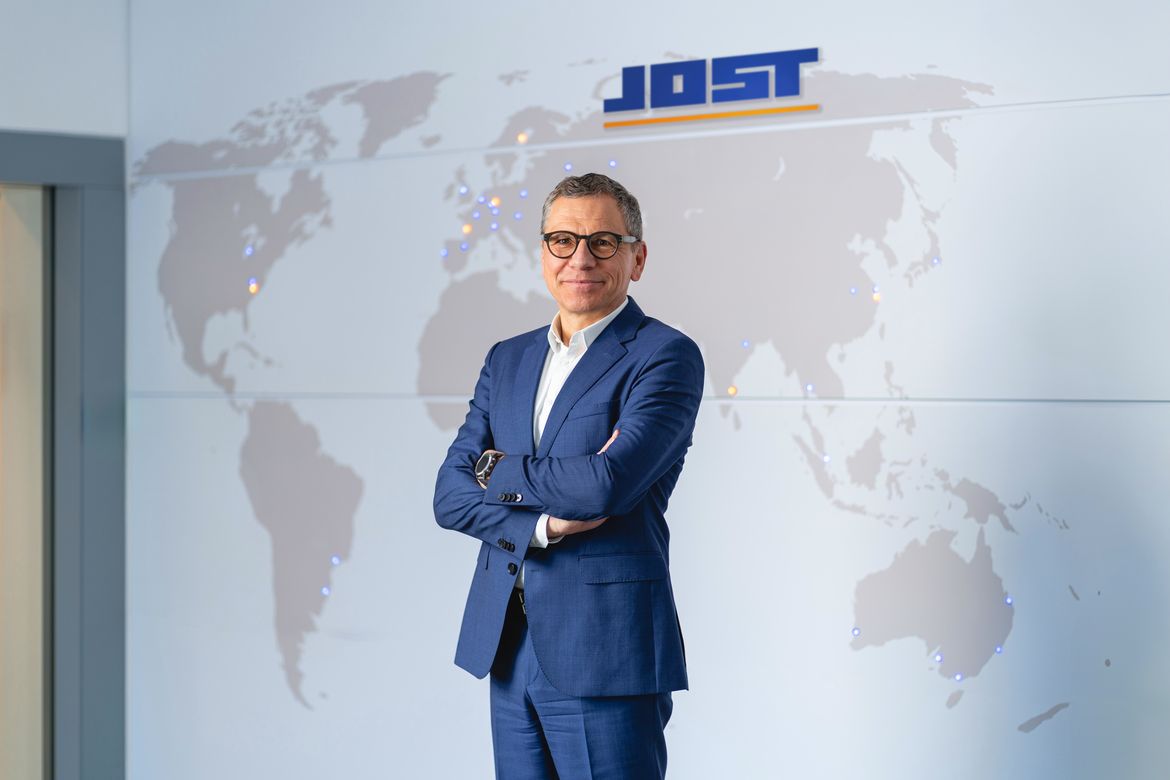Wirtschaftsforum: Mr. Dürr, for over 70 years, JOST Werke has been driving the development of smart systems in the commercial vehicle industry for agricultural applications and transportation – where exactly are your solutions used?
Joachim Dürr: In principle. at the interface between truck and trailer – where the respective towing vehicle has to be coupled with its trailer. Here, we provide both the mechanics and the hydraulics as well as the electronic support that ultimately make the system smart.
Wirtschaftsforum: What are the benefits of an intelligent coupling for users?
Joachim Dürr: A truck and its semi-trailer have to undergo relatively many coupling processes in daily practice – in the case of short-distance traffic, even several times a day. This process is not only repetitive and demanding but also not entirely safe, as the operator has to handle heavy weights, is exposed to weather conditions, and is not always in a protected area away from flowing traffic. Therefore, we have developed systems that consistently facilitate the corresponding coupling processes. Even though our direct customers are mainly OEMs from the commercial vehicle industry, we particularly focus on the needs of the end-users' profession to support them in their work. Given the widespread shortage of qualified drivers, corresponding gains in comfort and safety, as well as relief from physical demands, are essential to remain competitive in the market as an agricultural operation or logistics company.
Wirtschaftsforum: How exactly does the coupling become smart?
Joachim Dürr: First of all, through multiple sensors that, among other things, ensure that the king pin is locked into the fifth wheel coupling, so a firm mechanical connection exists between the towing vehicle and its trailer after coupling. They also ensure that the coupling device is at the correct height during the coupling process, namely as close to the trailer plate as possible. In addition, we use appropriate camera systems in our solutions that assist the driver in approaching the trailer and provide a clear view behind the vehicle when maneuvering to ensure the coupling process is correctly carried out and no incorrect coupling occurs.
Wirtschaftsforum: Are fully autonomous systems conceivable in this context?
Joachim Dürr: Our KKS assistance system is already fully automatable, so it can couple completely autonomously and can be used on autonomous vehicles accordingly. This not only creates a mechanical coupling but also a pneumatic and an electrical connection for light indicators and communication between the truck and trailer, ensuring the mutual exchange of various assistance systems. With this solution, the driver no longer has to get out and walk around the vehicle in wind and weather to perform a manual coupling process. This is not only a pleasant comfort advantage but also a safety-relevant aspect, especially with frequent coupling and uncoupling.
Wirtschaftsforum: Due to the (further) development of new drive technologies, the vehicle industry is currently undergoing profound changes – how much is JOST Werke affected by this development?
Joachim Dürr: In principle, it makes no difference to us whether a truck or tractor unit is powered electrically or by an internal combustion engine. However, this change naturally also has a significant impact on our range of activities, simply because it occupies our direct customers' attention: They are now primarily engaged in developing hydrogen-powered vehicles and managing complex supply chains for battery cells, so they can no longer devote the same intensity to integrating additional components. At the same time, the actual integration effort has even increased due to the ever-increasing functionality of coupling systems – here, our extensive expertise is even more in demand.
Wirtschaftsforum: How does the collaboration with OEMs work in this context?
Joachim Dürr: Not only have our coupling systems become more complex over the years, but many other components installed in vehicles have also. Previously, a simple fifth wheel coupling could be mounted relatively easily on the frame; today, the given possibilities are much more limited because many other large-volume components, such as exhaust aftertreatment systems, take up a lot of space. Due to these challenges in mere mechanical integration alone, our cooperation with manufacturers begins at a very early stage in the development phase. The technical challenges in hydraulic integration are sometimes even more complex, and last but not least, the electronic and digital components must also be integrated into the vehicle's infrastructure – after all, the driver should be able to easily use the information they provide in the cab. This is either possible via a separate display that we can provide or by integrating it into the respective OEM systems. Of course, there must also be consistent feedback with the respective vehicle – for example, to ensure it does not start moving if the coupling is not yet securely engaged.
Wirtschaftsforum: What further perspectives will emerge for JOST Werke in the coming years against this complex background?
Joachim Dürr: The driver shortage will remain an essential issue for the end customers of our solutions – that is why we want to further increase efficiency and safety to be able to address other driver profiles as well. Moreover, with sustainability, we will contribute to a smaller CO2 footprint through lighter and more efficient products. With the already mentioned high integration effort of our systems, there are also the multifaceted entanglements of globalised value chains, in the course of which the requirements for commercial vehicles continue to converge; here we see stronger global integration and standardisation in both the trailer and agricultural sectors in perspective with dealers and OEMs. To be able to prepare for this today, we have made acquisitions in recent years, among other things, in China, Northern Europe, and South America, so JOST-Werke can provide all solutions and corresponding services to its partners worldwide. Here, the highest possible utility gain in the entire value chain remains firmly at the center of our attention.
